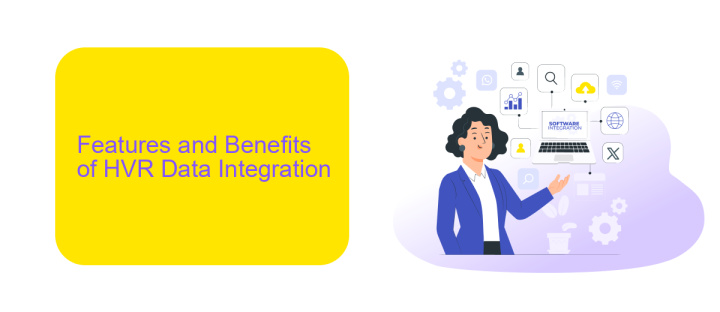HVR Data Integration
HVR Data Integration is a cutting-edge technology designed to streamline and enhance the process of data synchronization across diverse databases and platforms. By enabling real-time data replication and transformation, HVR ensures that businesses can maintain accurate, up-to-date information, thereby driving better decision-making and operational efficiency. Explore how HVR can revolutionize your data management strategy in this comprehensive overview.
Introduction: Overview of HVR Data Integration
HVR Data Integration is a powerful solution designed to streamline and enhance the process of data replication and integration across diverse environments. It ensures real-time data movement, enabling businesses to maintain data consistency and integrity across multiple platforms.
- Real-time data replication
- Support for a wide range of data sources and destinations
- High performance and scalability
- Comprehensive monitoring and management tools
One of the key advantages of HVR Data Integration is its ability to integrate seamlessly with various third-party services, such as ApiX-Drive. ApiX-Drive facilitates the setup of integrations by providing a user-friendly interface and a wide range of pre-built connectors, allowing businesses to quickly and efficiently connect their data sources. This synergy between HVR Data Integration and ApiX-Drive ensures that businesses can achieve robust and reliable data integration solutions with minimal effort.
Features and Benefits of HVR Data Integration

HVR Data Integration offers a robust solution for real-time data replication and integration across diverse platforms. Its high-performance capabilities ensure minimal latency and maximum data consistency, making it ideal for businesses that require up-to-date information for decision-making. The platform supports a wide range of databases and cloud environments, providing seamless data flow and reducing the complexity of managing multiple data sources.
One of the standout features of HVR is its ability to perform real-time data validation and monitoring, ensuring data integrity throughout the integration process. Additionally, HVR's user-friendly interface simplifies the setup and management of data pipelines. For those looking to further streamline their integration processes, services like ApiX-Drive can be utilized to automate and customize data workflows, enhancing the overall efficiency and effectiveness of HVR Data Integration. This combination of features and external tools makes HVR a powerful choice for comprehensive data management and integration.
Deployment and Integration Considerations

When deploying HVR for data integration, it's critical to consider several factors to ensure a smooth and efficient process. Proper planning and understanding of your infrastructure will help avoid common pitfalls and optimize performance.
- Assess your current infrastructure to determine compatibility with HVR.
- Ensure network stability and bandwidth to handle data replication and synchronization.
- Plan for scalability to accommodate future data growth and integration needs.
- Leverage tools like ApiX-Drive for seamless API integrations and automated workflows.
- Conduct thorough testing in a staging environment before full deployment.
By taking these considerations into account, you can enhance the efficiency and reliability of your HVR data integration. Utilizing services like ApiX-Drive can further streamline the setup process, allowing for more robust and automated data workflows. Proper deployment planning will ultimately lead to more effective data management and integration outcomes.
Use Cases and Success Stories

HVR Data Integration has proven to be a game-changer for various industries by enabling seamless data replication and integration across disparate systems. Companies have leveraged HVR to achieve real-time data synchronization, ensuring that their business operations run smoothly and efficiently.
One notable success story involves a global retail chain that implemented HVR to synchronize inventory data between their online and physical stores. This integration allowed them to maintain accurate stock levels, reducing instances of overstocking and stockouts, and ultimately improving customer satisfaction.
- Financial institutions use HVR for real-time fraud detection by integrating transaction data from multiple sources.
- Healthcare providers rely on HVR to consolidate patient data from various departments, enhancing patient care and operational efficiency.
- Manufacturing companies utilize HVR to integrate data from production lines and supply chain systems, optimizing their operations and reducing downtime.
For businesses looking to simplify their data integration processes, services like ApiX-Drive offer powerful tools to automate and manage integrations effortlessly. By using ApiX-Drive in conjunction with HVR, companies can further streamline their data workflows, ensuring that they remain agile and responsive in a competitive market.
Conclusion and Future Prospects
In conclusion, HVR Data Integration offers a robust solution for real-time data replication and integration across diverse environments. Its ability to handle large volumes of data with minimal latency makes it an essential tool for modern enterprises looking to maintain data consistency and reliability. As organizations continue to adopt multi-cloud and hybrid cloud strategies, the demand for efficient data integration solutions like HVR will only grow.
Looking ahead, the future prospects for HVR Data Integration are promising. With advancements in AI and machine learning, we can expect even more intelligent data handling and automation capabilities. Services like ApiX-Drive can further enhance the integration process by providing seamless connectivity between various applications and platforms, ensuring smooth data flow and reducing the complexity of integration tasks. As technology evolves, the role of HVR and complementary services will be crucial in enabling businesses to leverage their data for strategic advantage.
FAQ
What is HVR Data Integration?
How does HVR ensure data consistency during replication?
Can HVR Data Integration handle cloud environments?
What are the common use cases for HVR Data Integration?
How can I automate and configure my HVR Data Integration processes?
Strive to take your business to the next level, achieve your goals faster and more efficiently? Apix-Drive is your reliable assistant for these tasks. An online service and application connector will help you automate key business processes and get rid of the routine. You and your employees will free up time for important core tasks. Try Apix-Drive features for free to see the effectiveness of the online connector for yourself.

